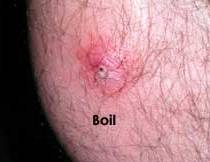
A boil on the butt can be a real pain in the you-know-what. Boils can range in size from the size of a pea to the size of your fist. Just imagine trying to sit with a boil like that on your behind! Boils on the buttocks can be very painful, and the pressure from sitting can make the pain worse and even worsen the infection.
Boils sometimes referred to as skin abscesses, are pockets of infection that develop just under the skin. They start out looking like a pimple but can get much larger than any pimple does and they are usually painful, as well. In most cases, boils are uncomfortable but not serious. In rare cases, however, the infection can go deeper and you can end up with a blood infection (sepsis), a heart infection (endocarditis), or a bone infection (osteomyelitis).
We’ll tell you how to treat boils on buttocks. We recommend you also check out our page on how to prevent boils. If you get boils on your butt often, even if they go away without medical treatment and don’t seem to be causing any serious problems, we suggest talking to your doctor about what might be causing them and what you can do to help prevent them. You can also learn more about chronic boils here.
Pilonidal Cysts
A pilonidal cyst is a type of boil that develops in the crease of the buttocks. What begins as a small infection becomes worse and worse due to irritation and pressure. Pilonidal cysts are most common after long trips that involved prolonged periods of sitting. You can help prevent them by making rest stops every few hours when driving long distances or getting up every couple of hours and walking in the aisle on long plane trips. This will also help prevent blood clots in your legs and other problems related to sitting for long periods of time.
Note that boils can develop on other parts of the buttocks, as well, though; not all butt boils are pilonidal cysts. Also, sitting for long periods of time is not the only thing that causes boils on your bottom.
Treating a Boil on Butt

Boils on the buttocks can often be treated at home without any professional medical attention. Try hot soaks or warm compresses to relieve discomfort and encourage the boil to come to a head, rupture, and drain. Over-the-counter pain relievers can also help with the discomfort. Try to avoid sitting for long periods of time, especially if sitting is painful. Even if sitting isn’t too uncomfortable, though, prolonged periods of pressure on a boil can make the inflammation and infection worse, so avoid long periods of sitting if you can.
If you have a boil on the butt that is extremely painful, if it doesn’t go away after two weeks, or if you are running a fever when you have a boil, you should see your doctor. You might need antibiotics or your doctor may need to lance and drain the boil.
Don’t try to squeeze, pop or lance a boil yourself, though. Done improperly, it can make the infection worse. Use hot soaks or warm compresses to encourage the boil to drain naturally. There are also homeopathic remedies you can use to help relieve symptoms like itching, pain, and swelling and to encourage the boil to drain naturally.
Our Preferred All-Natural Remedy For Boils on Buttocks
Our favorite all-natural remedy for boils is called NZ Country Manuka Oil. It contains only 100% pure Manuka essential oil, and relieves symptoms like itching, burning, stinging, pain, redness, and swelling while also helping the boil drain naturally and heal. It has anti-fungal and anti-bacterial properties and contains no additives or preservatives of any kind. To find out more about NZ Country 100% Manuka Oil and see if it can help you, just follow the link.
